German Shepherd Pregnancy Stages & Signs
Whether you have decided to breed your German Shepherd or you have found your German Shepherd pregnant with an unexpected litter of puppies, taking care of your German Shepherd during pregnancy is essential.
This will mean knowing not only what to expect, but what your dog needs from you as her owner as she goes through this process.
We have broken down everything that you need to know about German Shepherd pregnancy, delivery, and even the time frame German Shepherds have to get pregnant.
Here’s what you need to know to give your dog the best care possible.
How Long Are German Shepherds Pregnant For?
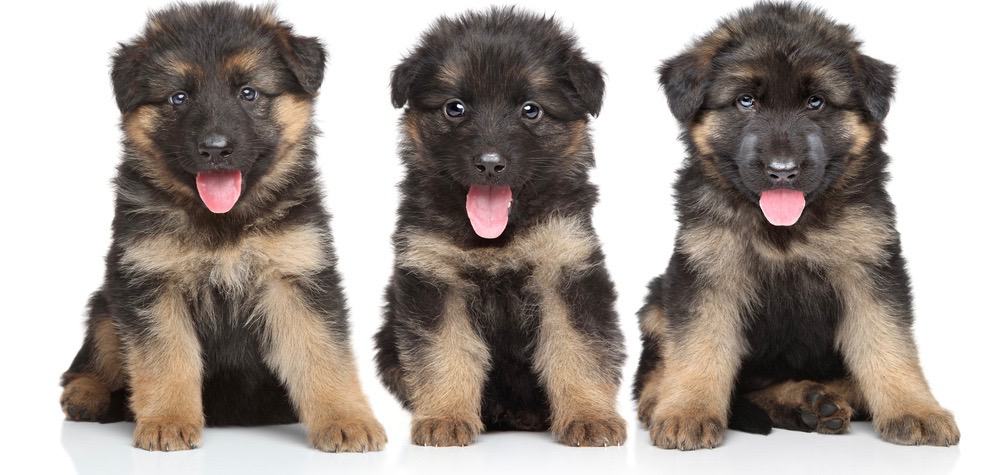
Even though different dogs are all the same species, they do not all have the same gestational period. Typically, German Shepherds are pregnant for about 63 days on average.
They are more likely to be early rather than late, but 63 is still the average length of time. It will come out to about 9 weeks total of pregnancy, following conception.
If you are not sure about the date of conception, it will be harder for you to know on your own what the estimated due date is. You will want to be under your vet’s care regardless, so your veterinarian should be able to give you an estimated gestation.
German Shepherd Pregnancy Stages
Week 1
The first week of pregnancy likely will happen without you even knowing it. Even if you know when your dog conceived the puppies, you will not necessarily know whether it took at this point.
Of course, if you are not aware that your dog conceived at all, you will definitely not know about the pregnancy yet. The first week is when the eggs are fertilized and her reproductive system will get kicked into gear.
You are not likely to see any behavioural changes at this point, because it is too new and your dog is not likely even aware that something has happened yet.
Week 2 & 3
During the second and third weeks of your German Shepherd’s pregnancy, you will start to notice some changes happening. During the second week, the fertilized eggs will attach to the lining of the uterus. This is called the endometrium.
That is when your dog’s hormones will really start to kick into gear and you are likely to notice even more changes. During the third week, your German Shepherd’s nipples are likely to swell in size and change colour.
Even though the pregnancy is new, your German Shepherd’s abdomen might begin to swell already and it should look like your dog is putting on weight.
There may or may not be some moodiness at this point, but you are more likely to see some lethargy rather than any major behavioural changes.
Your dog will also likely have more of an appetite. If you know about the pregnancy at this point, consult with your vet about the right food.
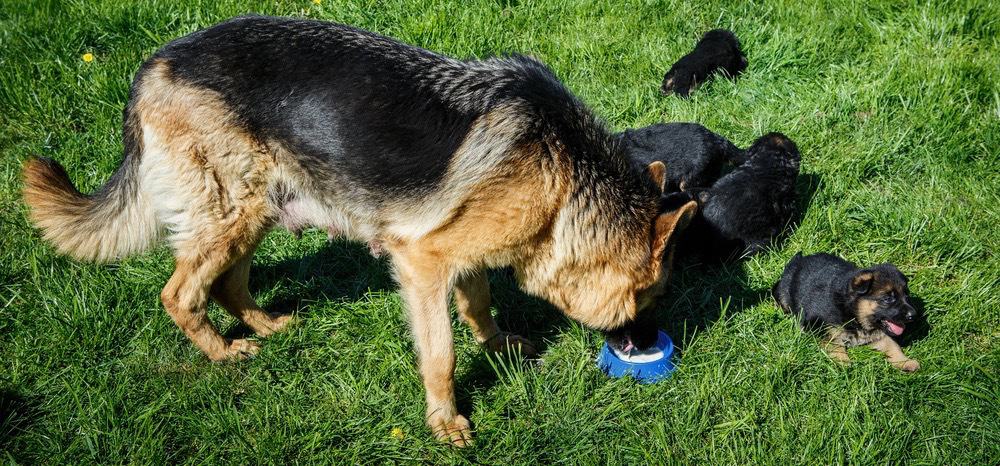
Week 4
When your German Shepherd has reached her fourth week of pregnancy, she will be getting a surge of hormones.
This is to help her body grow the puppies into healthy dogs, but it does come with some side effects. You might notice that your dog needs to urinate more often than before and likely will be drinking more.
Another symptom that you might see, which also happens with humans, is vomiting. Because of the surge of hormones, do not be surprised if your German Shepherd becomes nauseated during this week as her body adjusts to handle the puppies.
It is also at this stage that you will be able to take your dog to the vet for an ultrasound.
The ultrasound will confirm the pregnancy and will also allow you to see how many puppies your dog is expecting. Since dog’s do not have pregnancy tests like humans do, this is an important step in the process.
Week 5 & 6
Your German Shepherd’s stomach will start showing at this point. It is likely to be noticeable. Do not be surprised if your German Shepherd seems a lot hungrier than normal.
In fact, she might increase her weight by 20 to 50 percent at this point. She is growing puppies and will need more calories and nutrition than she would normally, so it is important to stay under your vet’s care at this point and get all of the prenatal advice that you can get.
By the sixth week, your German Shepherd is going to start feeling more uncomfortable and might be less likely to run about or less willing to go out on walks. She might also have some moodiness.
The puppies will be growing at a much faster speed at this point and you should be able to hear the heartbeats of the puppies through a stethoscope.
Week 7
Your German Shepherd is going to have a lot more behavioural changes at this week in pregnancy. Her abdomen will be large and firm and will be experiencing some vaginal discharge.
The puppies themselves will be pretty large at this point, though this is too early for them to be born. While they are a large breed, you still do not want to have premature puppies.
Your German Shepherd’s activity level will be dropping to practical nonexistence at this point as she is not comfortable and will not be as willing to head out on adventures as she once was.
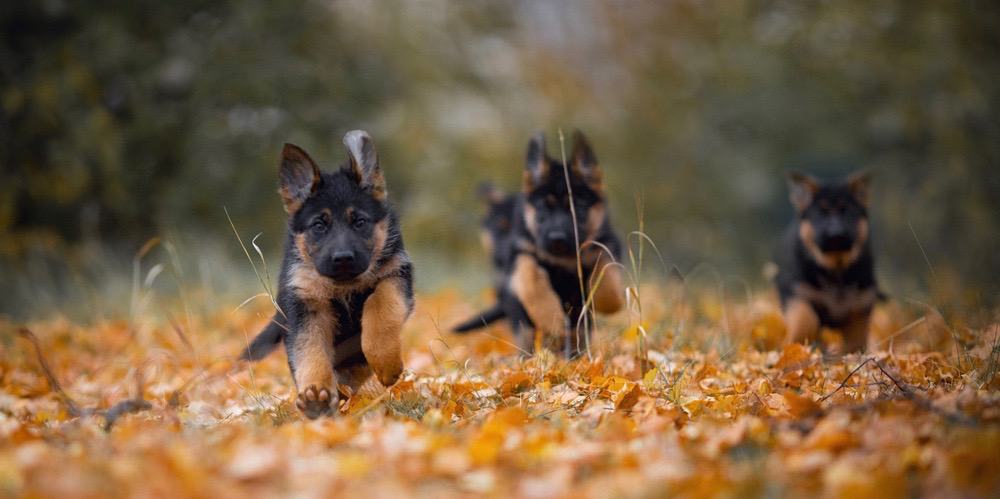
Week 8
During the eighth week of pregnancy, your German Shepherd will start to lose her appetite. Even though she is providing food for the puppies that she is carrying, she will have much less room in her stomach, because of the puppies pressing on it.
She is going to be very tired by this point, so make sure that you are giving her as much love and care as possible. Her nipples will swell as well and become insanely large as her body prepares to deliver her puppies into the world.
You also should be able to see the puppies shift around in her abdomen as they reposition themselves.
Week 9
This is the final stage of pregnancy and means your pup is getting close to delivery. The puppies will be fully formed at this can and be moving toward the birth canal.
Your German Shepherd is likely to be uncomfortable and acting very restless at this point.
She is likely looking for a safe place to nest and await the arrival of her puppies. Comfort your dog as much as possible, ensuring that she feels safe in your home, knowing she can deliver her puppies in the home without needing to worry about it. Keep your home as calm as possible.
German Shepherd Pregnancy Signs

Changes In Appetite
Another big indicator of pregnancy has to do with changes in your dog’s appetite.
There is a good chance that throughout pregnancy, your German Shepherd will either be more hungry than normal or lose her appetite completely, becoming less willing to eat.
Part of this has to do with hormones and the other part has more to do with the puppies pressing into her internal organs, making her less willing to fill her stomach with food.
At the beginning of pregnancy, she might have morning sickness and even vomit, much in the way that humans do.
In the middle of her pregnancy, she is likely to have more of an appetite and eat voraciously as she puts on weight.
At the end of her pregnancy, she will likely not feel well and will be less inclined to eat. Most of the fluctuations have to do with her fluctuation in hormones.
Behavioural Changes
Behavioural changes are one of the biggest initial indicators that your dog might be pregnant.
These changes can appear in a wide variety of ways, but one of the most obvious is that she will be clingier with her owners than she would be normally.
She will be seeking comfort from the people around her. While some German Shepherds will be seeking attention, others will behave in the exact opposite manner and look for as much isolation as possible.
She might seem depressed or down. It is even possible that she responds negatively when given attention or affection, desiring instead to be left completely alone.
Some German Shepherds will also begin to build nests for themselves by destroying bedding in an attempt to make a soft space to have their puppies.
Because of the unpredictable moodiness, make sure your dog does not have interaction with small children because she may lash out and nip at them.
Enlarged Or Discoloured Nipples
Changes in your German Shepherd’s nipples is another way to see whether your dog is pregnant. In the early stage of pregnancy, you will notice that your dog’s nipples will become more noticeable and rounder than they are normally.
They will also darken in color due to the increased blood flow to them. When your dog is close to delivery, the nipples will further increase in size as they prepare to provide milk to the puppies.
In some cases, the nipples might even leak milk later in pregnancy, before the puppies are even born.
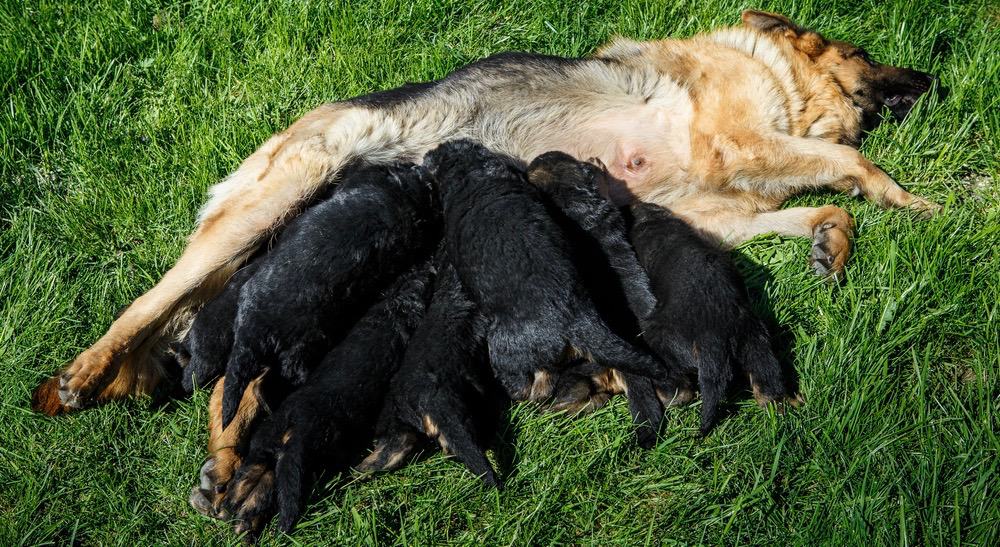
Weight Gain & Enlarged Abdomen
The final clue that you will get that your German Shepherd might be pregnant is her weight gain and swollen abdomen. Normally, a dog of healthy weight will have a nicely defined waist.
Your German Shepherd’s waist will begin to disappear, with her abdomen growing in size instead. In early pregnancy, the abdomen will not be insanely large in size, but she should noticeably become heavier.
When this happens, you will need to take your dog to the vet to confirm the pregnancy and the health of your dog. As her pregnancy progresses, her abdomen will swell as the puppies grow in size.
When Can German Shepherds Get Pregnant?
There are four stages to a dog’s heat cycle. The first stage is known as the Proestrus stage, which will last about 9 days. This is the beginning of the heat and your dog will not willingly mate with a male.
During the Estrus stage, your dog will be receptive to males and there is a higher chance of conception. This can last anywhere from 3 days to 11 days.
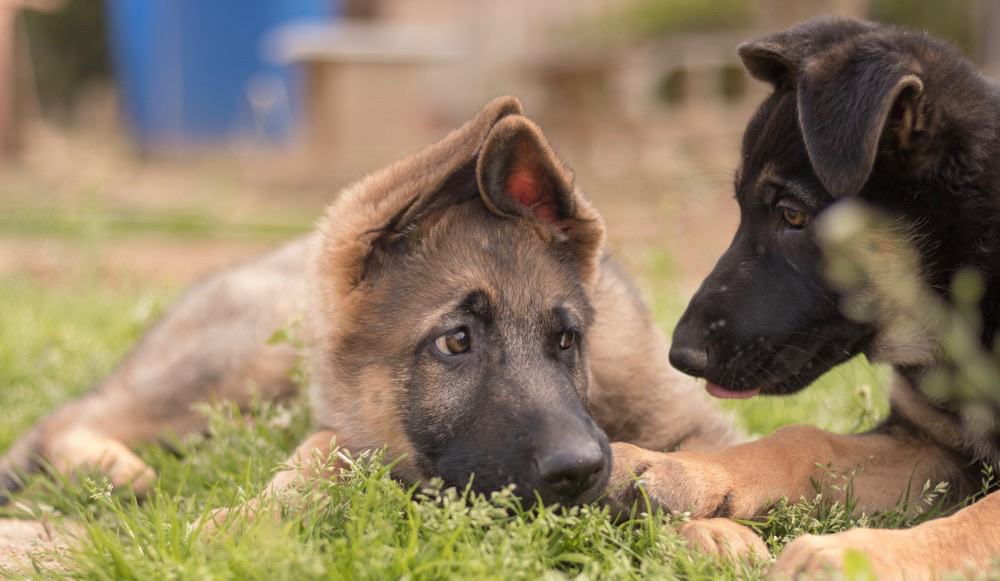
Diestrus is the next stage, which starts on the 14th day of your dog’s heat cycle. This completes the heat cycle. Anestrus is the stage in between heat cycles.
How To Confirm That Your German Shepherd Is Pregnant
Ultrasounds
The quickest and most effective way of confirming your German Shepherd’s pregnancy is to have your vet perform an ultrasound on her.
You can have this done as early as 3 weeks into your dog’s pregnancy, but it might not be completely accurate until around 25 days after conception.
The ultrasound will be non-invasive and has no risks to your dog or the puppies within.
Really, the only downsides to an ultrasound are the cost, which will range from $300 to $500 depending on where you are, and the fact that the vet will need to shave your dog’s belly in order to get a good scan of the puppies within.
To avoid paying for an unnecessary ultrasound, many breeders will wait until the dog is showing clear signs of pregnancy before confirming and determining how many puppies lie within. Early ultrasounds are not going to be completely accurate.
Blood Sample
While there is no pregnancy urine test for dogs like there is for humans, there is a blood test that can also be performed.
You can have a blood sample drawn after 5 weeks have passed since mating. It is a lot cheaper than an ultrasound is and less invasive.
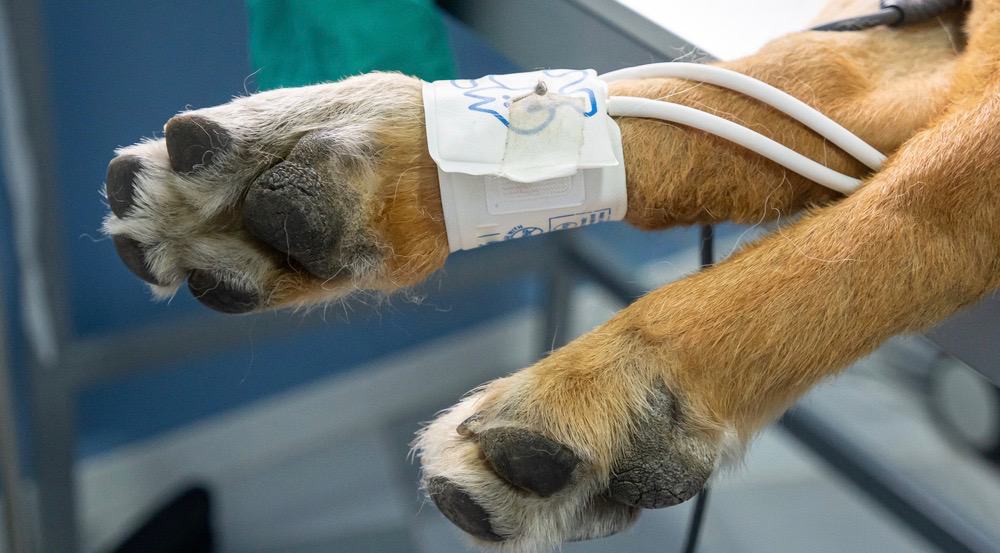
It will not pick up on the pregnancy hormone if you do it too early in the pregnancy, so there is a chance that you will get a false negative. Make sure to wait until after the 35-day mark before having a blood test done.
German Shepherd Stages Of Labour
Stage 1
Stage 1 starts the day before delivery. Your dog will refuse to eat or drink and become restless at this stage.
Contractions will begin at this stage, but they are not severe. This is a long stage, so keep your dog as quiet and calm as possible to help her get through it.
Stage 2
Stage 2 is the active part of labour with severe contractions and the part where your dog will give birth to her puppies.
This can also last 24 hours as your dog gives birth to her puppies. She should deliver about 1 an hour, but if it has been 2 hours since the last puppy, there might be a problem.
Stage 3
Stage 3 will happen simultaneously with Stage 2. It starts when the placenta has been released from your dog’s uterus after the birth of the puppies. It starts when the first puppy appears and ends when the last placenta has been delivered.
Caring For A Pregnant German Shepherd
If your German Shepherd is pregnant, it is essential that you give her as much care as you possibly can. Pregnant dogs always have different nutritional needs than dogs do when they are not pregnant.
Unfortunately, the nutritional needs of a pregnant German Shepherd are not likely to be met by her everyday food. You should consult with your vet to know exactly which food and how much you should be giving your dog, as well as any nutritional supplements that she might need.
Beyond food, you will want to make sure that your dog gets exercise, but not too much, and has an opportunity to rest as much as she needs to.
How Do German Shepherds Give Birth?
Natural Birth
Since German Shepherds are a large dog breed, they will not need as much help giving birth as the smaller dog breeds might. All the same, you will want to stay with your dog as she gives birth.
You can help by making sure that she is as comfortable as possible during the first part of labour. Labour is often not a speedy process for German Shepherds and it can easily take up to 18 hours.
You will want to make sure she is in a calm, clean, and safe environment.
When she moves into active labour, she will experience contractions and will need your calming presence to reassure her that all is well.
You will likely see fluid leak out before the birth of each puppy. The puppies will not all come out at the same time but will come out slowly. Your dog is likely to lick the newborns as they come out, which is completely normal.
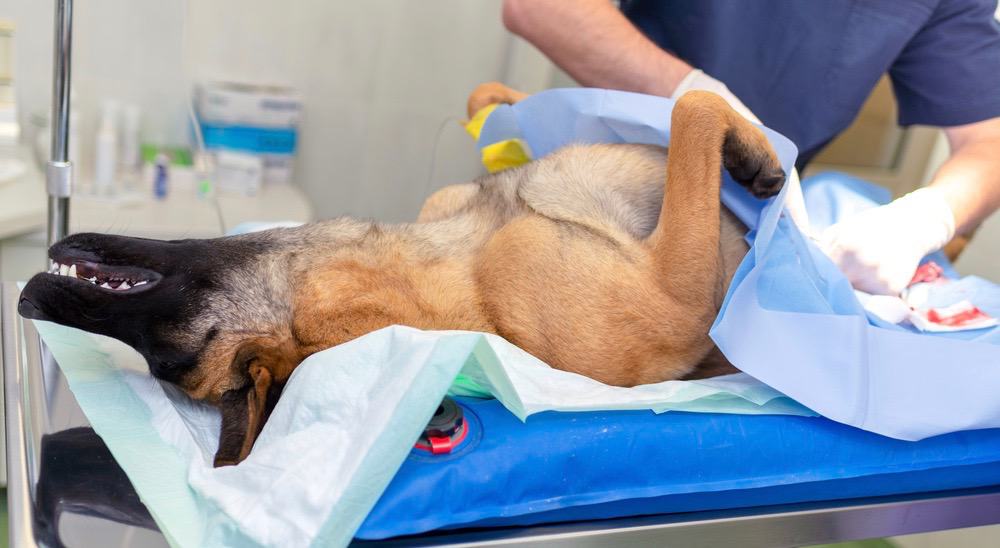
C-section
Just like with humans, there are some cases where a German Shepherd might need to have a c-section rather than giving birth naturally.
Your vet should be able to guide you through any risks that might be known before the birth so you can be prepared for a c-section if it happens.
A c-section is where the vet will make an incision through your dog’s uterus to get the puppies out that way. If your dog has been in labour for a longer than normal time, a c-section might be the only way to remove the puppies as well.
How Many Puppies Do German Shepherds Have?
A common question for German Shepherd owners looking to breed their German Shepherd is how many puppies a German Shepherd can have.
The answer is a little bit tricky and might even be unexpected. Due to the restrictions of a purebred pedigree with German Shepherds, on average they will only have about 5 puppies in a litter.
They can certainly have more, but the purer the pedigree, the fewer puppies you will get. Historically, the largest litter attributed to a purebred German Shepherd was 17 puppies, but this is highly unusual. For a large breed, they do not have many puppies in a litter.
Final Words
It is an exciting time when your German Shepherd is pregnant. While the process is natural, it is much faster for dogs than it is for humans.
You will want to make sure that you are completely under your veterinarian’s guidance during the entire process, giving your dog and her puppies the care and the nutrition that they all need in order to be as healthy as possible.
If you are new to breeding and don’t know where to start, you should talk to your vet as well as other breeders in your area to get the information you need.






